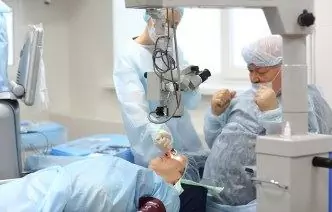Israel's Secret Medicine
Israel occupies top positions in the ratings of the World Health Organization (WHO) for the quality of medicine. The accuracy of diagnosis and high efficiency of treatment in Israeli clinics are not in doubt.

Source: depositphotos.com
How did a small state manage to create such a powerful medical base? What is the secret of the success of Israeli clinics? And why are Israeli specialists known all over the world? Yekaterina Kochergan, senior coordinator of the Bookimed International Patient Support Center, answers questions.
Thanks to what factors today we know that Israel's medicine is one of the best in the world?
The high level of medicine in Israel is confirmed every year by world rankings and statistics. In 2016, the WHO ranked Israel the 4th most effective treatment in the world. And in the ranking of the International Center for Health Research, Israel is in 1st place in the quality of medical services.
Israel's cancer rates are also one of the highest in the world. In the CIS countries, the success rate of treatment is 45%, in Israel - 80%.
The high level of medicine in the country also affects the life expectancy of its citizens. According to the UN, Israel is in 1st place in the world in terms of life expectancy for men (80 years), for women - 3rd place (average age - 84 years).
Is there really a secret to Israeli medicine success? What is it?
The success of medicine is due to several factors. This is the professionalism of doctors, an excellent technical base of clinics and active research in the field of healthcare.
High treatment rates are also associated with a diagnostic approach. According to statistics, every fourth patient from the CIS comes to Israel for treatment with an incorrect diagnosis. Namely, the result of treatment depends on the accuracy of the diagnosis. Therefore, Israeli doctors assign an important role to a comprehensive examination of the patient. The accuracy of diagnostic procedures in Israel is 99%.
How has the state influenced the development of medicine in Israel? How is this country's healthcare system different from others? Perhaps some radical reforms were carried out, or was medicine built like this from the very beginning?
The development of medicine has always been a strategically important area for Israel. Scientific developments in the field of medicine are carried out with the support of the state. Israeli clinics invite the best doctors from all over the world to work.
The medical education system with strict requirements for future doctors deserves special attention. The competition for the Faculty of Medicine can be up to 700 people per place. Only the best pass. Further - at least 16 years of study from a student to a qualified specialist with a license.
During their medical practice, Israeli doctors go to Europe and the USA for six-month internships every few years. In addition, the state organizes international symposia and conferences on medicine. The best minds from all over the world come to Israel to share their experiences and take part in scientific research.
State medical centers carry out compulsory certification of doctors. The tests establish the competence of the specialist, his knowledge of new treatment technologies. Such strict requirements allow only professionals to work.
Israeli doctors value their licenses very much and are legally criminally liable for negligence and medical error.
Advertising and marketing play an important role in the positive image of Israeli medicine. Who mainly works on this - private clinics?
In many ways, the world community is familiar with Israel's medicine through the media. You can often see news about the discoveries of Israeli scientists in the field of cancer treatment.
As for advertising campaigns, this is the area of responsibility of international departments of public and private clinics. They are the ones who receive foreign patients. Advertising is carried out in different ways: on the Internet, at exhibitions, through international cooperation. Many clinics are official partners of our Bookimed Patient Support Center.
A positive image is also formed by the reviews of patients who have already received treatment in Israel. As a rule, they are satisfied with the treatment results and stay in the country.
What clinics or what treatment methods are in the greatest demand in Israel?
The most famous government clinics in Israel are the M. Sourasky (Ichilov), hospital. Haima Sheba, Hadassah MC, Rambam Hospital, Yitzhak Rabin MC. From private - Assuta clinic, Herzliya Medical Center.

Medical Center. Sourasky (Ichilov)
If we talk about treatment methods, organ-preserving and robotic surgery is in demand, which is not available in the CIS countries. Israeli doctors also perform complex operations on the brain, use radiosurgery (Gamma Knife, Cyber Knife). In oncology, sparing chemotherapy drugs and effective radiation therapy are used.
How has medical tourism in Israel been developing recently? What diseases do citizens of other countries go to treat?
The number of foreign patients in Israel is growing every year. In 2006, the country admitted 15,000 people for treatment. In 2016 - twice as many, 30,000 patients. This indicates the development of medical tourism in the country.
People come to Israel for treatment of cancer, neurological pathologies (Parkinson's disease, multiple sclerosis), gynecological, urological, cardiological diseases. Operations on the brain are in demand, because Israeli clinics have a powerful neurosurgical base.
From which countries do they most often go to Israel for treatment?
Most often, treatment in Israel is chosen by patients from Ukraine, Russia, Belarus, Georgia, Great Britain, and the USA. Less commonly - patients from Turkey, Kazakhstan, Uzbekistan, Turkmenistan and Kyrgyzstan.
Found a mistake in the text? Select it and press Ctrl + Enter.







